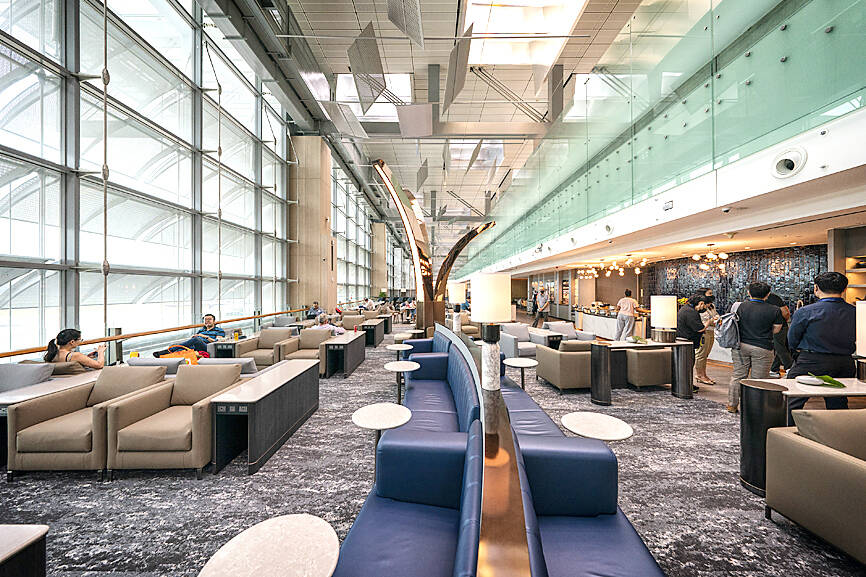Singapore pushed New York off the top spot for the strongest growth in residential rents in the final quarter of last year, fueled by a supply crunch and strong demand.
The city-state saw annual rents jump 28 percent in the quarter from a year earlier, Knight Frank said in a report.
New York followed with 19 percent growth, while London and Toronto took the third and fourth spots, a survey of prime residential rents across 10 cities showed.

Photo: Bloomberg
Singapore’s soaring rents — driven partly due to a lack of supply of new housing during the COVID-19 pandemic — have been a source of consternation for residents, sapping household budgets at a time when living costs are surging.
New visa rules to attract foreign talent are likely to supplement tenant demand.
The city has 17,000 private homes that are set for completion this year, which could provide some relief to accommodation pressures, said Leonard Tay, Knight Frank’s head of research in Singapore.
Ranked at the bottom of the list is Hong Kong, where rents fell 6.4 percent year-on-year as international companies deferred expansion plans, the report said.
Demand from tenants has dwindled as people left the territory during the pandemic.
While prime rents have remained robust across many global cities, the overall rate of annual growth is starting to slow, Knight Frank said.
Separately, Singapore Changi Airport has regained its title as the world’s best airport, after losing its long-held crown to Qatar for two years running during the height of pandemic travel restrictions.
Singapore pushed Doha’s Hamad International Airport into second place, with Tokyo’s Haneda Airport bagging third, in this year’s Skytrax World Airport Awards.
The US was conspicuous by its absence in the top 10.
Paris Charles de Gaulle Airport was Europe’s top performer, up one spot to fifth place, while Seattle-Tacoma International Airport was the highest ranked North American airport, languishing in 18th place, but an improvement from 27th place last year.

BYPASSING CHINA TARIFFS: In the first five months of this year, Foxconn sent US$4.4bn of iPhones to the US from India, compared with US$3.7bn in the whole of last year Nearly all the iPhones exported by Foxconn Technology Group (富士康科技集團) from India went to the US between March and last month, customs data showed, far above last year’s average of 50 percent and a clear sign of Apple Inc’s efforts to bypass high US tariffs imposed on China. The numbers, being reported by Reuters for the first time, show that Apple has realigned its India exports to almost exclusively serve the US market, when previously the devices were more widely distributed to nations including the Netherlands and the Czech Republic. During March to last month, Foxconn, known as Hon Hai Precision Industry

Taiwan Semiconductor Manufacturing Co (TSMC, 台積電) and the University of Tokyo (UTokyo) yesterday announced the launch of the TSMC-UTokyo Lab to promote advanced semiconductor research, education and talent development. The lab is TSMC’s first laboratory collaboration with a university outside Taiwan, the company said in a statement. The lab would leverage “the extensive knowledge, experience, and creativity” of both institutions, the company said. It is located in the Asano Section of UTokyo’s Hongo, Tokyo, campus and would be managed by UTokyo faculty, guided by directors from UTokyo and TSMC, the company said. TSMC began working with UTokyo in 2019, resulting in 21 research projects,

Taiwan’s property market is entering a freeze, with mortgage activity across the nation’s six largest cities plummeting in the first quarter, H&B Realty Co (住商不動產) said yesterday, citing mounting pressure on housing demand amid tighter lending rules and regulatory curbs. Mortgage applications in Taipei, New Taipei City, Taoyuan, Taichung, Tainan and Kaohsiung totaled 28,078 from January to March, a sharp 36.3 percent decline from 44,082 in the same period last year, the nation’s largest real-estate brokerage by franchise said, citing data from the Joint Credit Information Center (JCIC, 聯徵中心). “The simultaneous decline across all six cities reflects just how drastically the market

Ashton Hall’s morning routine involves dunking his head in iced Saratoga Spring Water. For the company that sells the bottled water — Hall’s brand of choice for drinking, brushing his teeth and submerging himself — that is fantastic news. “We’re so thankful to this incredible fitness influencer called Ashton Hall,” Saratoga owner Primo Brands Corp’s CEO Robbert Rietbroek said on an earnings call after Hall’s morning routine video went viral. “He really helped put our brand on the map.” Primo Brands, which was not affiliated with Hall when he made his video, is among the increasing number of companies benefiting from influencer